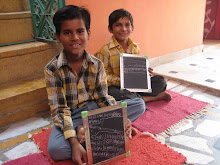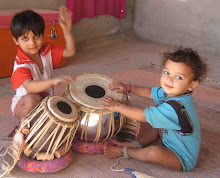Yesterday evening, I was walking down the narrow, cobbled street to the Merasi School. My traveling companion was a three foot tall stick of dynamite named Hayad who wore no shoes and had a chest pocket filled with little firecrackers. ABCs had not been sticking with Hayad, so we were going back to school to burn a bit of mental midnight oil before the test the next day. We walked side by side along the narrow road lined with rusty motorcycles, empty biscuit packets, and lethargic cows, talking about his favorite candy, a heavenly little chocolate concoction called Five Star bars.
All of a sudden, a green and yellow auto-rickshaw whizzed around the corner and Hayad instinctively turned his body towards mine. The rickshaw missed him by about three inches and continued to zip on into the night. Hayad resumed walking normally, not skipping a conversational beat. I, however, did not spring back to chitchat with the same ease. My little man had just missed severe injury by a finger's length. In my book, that was way too close for comfort.
Later that night, I sat eating an apple and trying to hash through what had rattled me so much. I'd seen much worse, heard stories that left your heart in wet, crumpled up pieces, and watched women return to husbands who burned and beat them. But this little rickshaw run-in had dug in deep under my skin and I think it has something to do with the fact that Hayad's existence has so little margin for error. His precious life is positioned on a delicate tightrope, where three inches can mean the difference between safety and destruction. Society has stingily given him next to no space for mistakes; there is no generosity or forgiveness towards Merasi who fumble. Bandaids, safety nets and cushioning to ease the fall are reserved for somewhat more privileged folks. If Hayad missteps, he tumbles heavily and fast.
Merasi School co-founder Sarwar Khan and I talk about education as nothing more and nothing less than nurturing the skills to create opportunity. And built into that is an expanded margin of error -- we are, as humans, expected and entitled to fall to our knees. Education strengthens the muscles that bounce you back, re-aligning your spine with a bit more ummmph and know-how than the last time your nose kissed the pavement.So, Hayad and I worked on abc's well into the night, with each letter, pushing to fiercely, constructively, and compassionately widen that tiny pocket of grace he' s been granted.
Subscribe to:
Post Comments (Atom)


2 comments:
Our life is so fragile, yet the life of the Merasi is built on survival. They are not brought up, trained, or conditioned to believe that they need to do anything other than survive. We, as Americans (particularly here in Maine) are not brought up to be defensive in that way. We are raised with trust, educational opportunities,minimal safety tactics, and virtually no danger. That is why it is so wonderful that you are there...educating them in a way that goes beyond the "norm"! Show them what it is like to be FREE!Yet... Be rattled by the nonchalance of a young one who barely escaped death, but please know that you are providing an opportunity for change in a way that is the most positive!
Ironically, I have spent the weekend creating Halloween costumes for two children that recently lost their father to a fatal car crash. The Mother survived (amazingly) and is doing everything possible to make their lives normal and fulfilled.I am honored and humbled to be able to provide these cute, Asian-American children with their greatest wishes (for the moment), yet I am finding myself thinking of the VERY BEST Halloween ever...when the Merasi "trick-or-treated" with us here in Camden in 2005.
Post a Comment